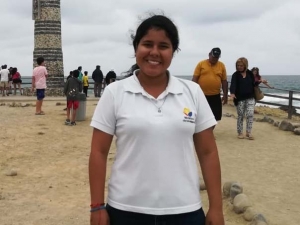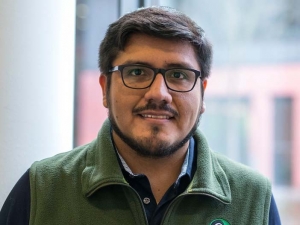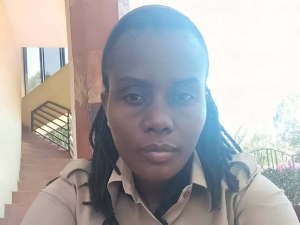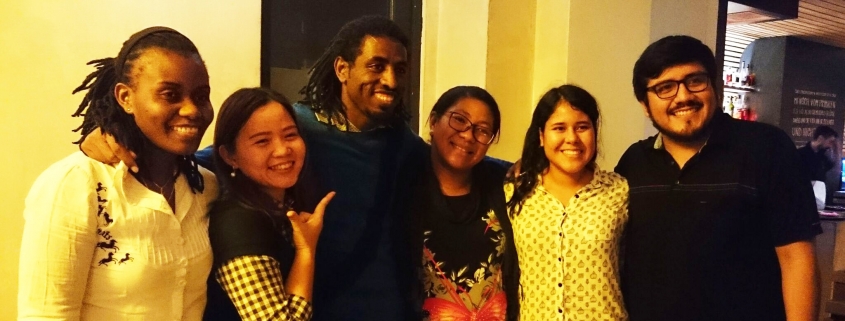Five Months On – Our KfW Foundation Scholars
Frankfurt Spring School 2018 is already starting to feel like a distant memory. In reality only five months have passed. And yet, in this short time frame, we can observe our pioneering conservationists forging their careers.
During this year’s Spring School blog we focussed amongst others on some of our participants from around the world – our six KfW Foundation scholarship students. To catch up on their stories in detail, follow this link to a previous blog post.
Each scholarship holder brought with them a dream project proposal that would support the conservation of their respective protected areas. To further its aim of supporting pioneering ideas and environmental protection, the KfW Foundation pledged funding to three of the six scholars.
Following the intensive Spring School programme, a series of individual mentoring sessions, and hours upon hours of planning and practice, the scholarship holders presented their project proposals to the KfW Foundation selection committee. The committee was tasked with an impossible decision, believing that each project proposal was deserving of funding. Ultimately, a decision had to be made.
The 2018 recipients of the KfW Foundation scholarship grant are:
Jennifer Montoya Lopez (Ministry of Environment, Ecuador) – “Conservation of bottlenose dolphins (Tursiops truncates) at Puntila de Santa Elena Wildlife Reserve”

Photo provided by Jennifer Montoya Lopez
The salty pacific waters off the coast of Ecuador are the dwelling of a treasured bottlenose dolphin population and a rich variety of marine life. Humans have long fished these waters to support livelihoods, but in recent years overfishing within the protected area and lack of oversight by local fishing authorities have threatened the dolphins’ food source.
Jennifer’s conservation efforts will begin with an awareness campaign encouraging responsible usage of the marine fauna by local fishermen. The project involves generating a strong commitment between the fishing authorities and Ministry of Environment to ensure respect for the existing fishing regulations. It is Jennifer’s hope that the defined actions for the management of the project area will be used as a pilot study for future global conservation projects related to fishing and marine animals.
Kevin Ibañez Saravia (Frankfurt Zoological Society, Peru) – “Strengthening the conservation of the Yellow-spotted river turtle (Podocnemis unifilis) in the Heath River basin, Peru/Bolivia”

Photo by Daniel Rosengren
In the depths of Peru’s Bahuaja Sonene National Park lies the Heath River basin, a stretch of water surrounded by dense tropical rainforest. The area is home to a great diversity of life, including the vulnerable yellow-spotted river turtle. But, it has come under threat in recent years due to increased mining, logging and human expansion within the park.
The eggs of the river turtle are used as a food source for native communities but are starting to become popular in the commercial market of growing nearby cities. The increased demand is driving unsustainable collection rates. Kevin’s project will involve the use of outreach to engage those living in the area, restoring harmony between humans and the national park. He will oversee the creation of beaches protected from human access, a resource efficient method of preserving the Heath river basin turtle population.
Joyce Mungure (Tanzania National Parks) – “Bee-keeping for sustainability in villages adjacent to the Serengeti National Park”

Photo provided by Joyce Mungure
The famous megafauna of Tanzania’s Serengeti National Park includes elephants, rhinoceros, lions, buffalo, and many more. The consequences of conflict between these animals and humans can be severe, but the monetary value of some of these species in international markets and the ever-present need for food makes this risk worth it for some. As the population of villages bordering Tanzania’s Serengeti National Park continues to expand, the rate of interaction between wildlife and human communities rises too. Excessive exploitation of the land and poaching are great threats to this bastion of biodiversity.
Joyce’s plan will utilise beehives to provide a new socioeconomic opportunity for villages within the area. It is hoped that providing education on sustainable use of natural resources and the methods of beekeeping will reduce the burdens of poaching and unsustainable land-use on the ecosystem.
The busy months ahead will be a great challenge for each of the KfW Foundation grant recipients, but there is no doubt about their dedication and ability to succeed. We are excited to see the effects of their enacted conservation projects as they unfold.
It would be wrong to forget the equal amounts of hard-work and development carried out by the three remaining KfW participants during the 2018 Spring School programme. Lalatiana Randriamiharisoa, Tinh Nguyen Thi, and Muluken Abayneh have returned to their conservation areas around the world, not empty handed, but with an enriched skillset and motivation to become key assets to their respective projects and within the protected ares where they work.
We wish all six 2018 KfW scholarship holders the greatest success in their endeavours during the hard months and years to come.


 Daniel Rosengren
Daniel Rosengren